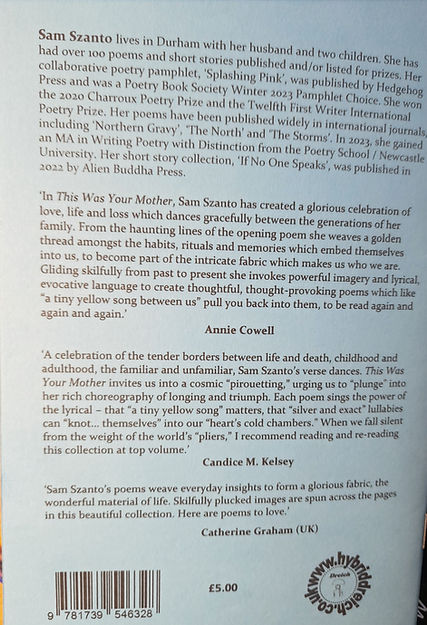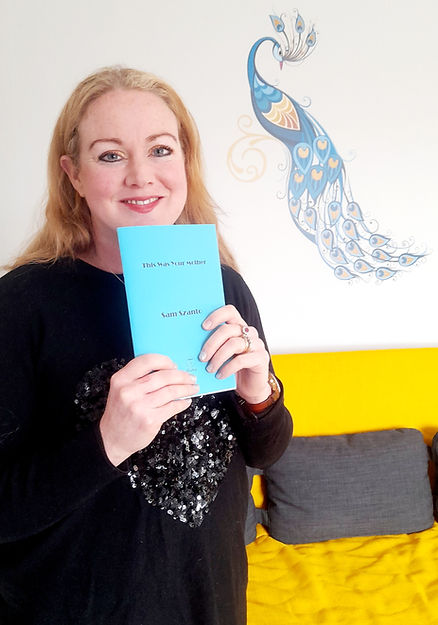20 Questions with... Caroljean Gavin
- samszanto2
- Sep 3, 2023
- 6 min read

Caroljean Gavin’s latest book is Caught in the Throat (Alien Buddha Press). Her work also appears in places such as Milk Candy Review, Barrelhouse, Pithead Chapel, The Forge, and X-R-A-Y. She’s the editor of What I Thought of Ain’t Funny, an anthology of short fiction based on the jokes of Mitch Hedberg. Twitter:@caroljeangavin
1. Please introduce yourself. Where are you from? What was your life like growing up?
I am Caroljean Gavin. I was born in Redwood City California, grew up in Pacifica and Gilroy, CA lived in San Francisco for a while, then New York and now North Carolina!
I was named after my mom’s late sister, Caroljean Alma. Growing up the daughter of a woman who was abused as a child was rough, especially when I had her sister’s name. My dad’s also a Vietnam vet, and we lived on earthquake land, so stability wasn’t really a thing. But beaches and swimming pools were. I learned to love the water and imagine over the horizon.
2. Did you always want to be a writer? If you also work, what do you do / did you do?
Before I wrote I sang songs to myself and read and played make believe. These make believes would get more intricate as time went on and would be influenced by books I read, like Island of the Blue Dolphins. Pretending to be an orphan or in boarding school was also a popular game.
I love the Ursula Le Guin quote on this which is something like “I always was a writer.”
I am also a freelance editor and copywriter looking for work!
3. Tell us about your most recently published work in a sentence.
Caught in the Throat is an intense, raw, and playful collection of creative nonfiction pieces about how writers or artists express their truths through their art vs. in real life.

4. What are you working on right now?
I have a short story collection I’m constantly polishing, half a novel about creating a new world out of sound, half a novel about a rock star running from the corpses of her past, and another half-ish a novel about a woman who bakes with the ghosts she finds in the fog.
5. Do you have a writing routine, and if so what is it?
I do not currently have one. Right now, it’s come down to making myself actively remember I’m a writer each day.
6. Where do you write – always in the same space, or different places? Can you write ‘on the move’?
I have a big office – the master bedroom of our rental house. There’s a beautiful desk, a raven lamp, and a microphone in case I ever start a podcast. But I also like writing on the floor, in bed, on post-it notes, on my hand…I’m not really a coffee shop writer though. I need things to be pretty quiet.
7. What advice do you have for other authors who are starting out? What is the best advice you’ve heard?
It’s so annoying, but the best advice I’ve heard is to write.
The thing is so many people want to be amazing right away and mostly that’s not going to happen. You have to write to figure out who you are as a writer. You have to write to learn how to write.
Another thing is that writers, especially beginners can be a little too precious about their writing. They might want to keep every single word they’ve written. They might think everything they write has to be good enough to publish.
One of my favourite things to do especially when writing something longer is “creative research” where I might write a monologue from the point of view of a different character or come up with a scene that I know won’t appear in the book. Even if these things are never read by anyone else, they are useful. Sometimes you find treasure here. One of these “creative research” stories of mine ended up being published in Pithead Chapel and then Best Small Fictions 2021.
No word is a waste.
8. Do you enjoy doing live readings or are they a necessary evil – or somewhere in between?
I LOVE them. I wanted to act when I was younger, so I love taking advantage of the performative aspect of it. I’ve actually heard that my stories hit differently when people hear me read them. Not everyone enjoys reading though, especially prose writers, and I think you can usually tell when that’s the case. Then you might think it’s a necessary evil. But I enjoy it so much.
9. Are there recurring themes in your work? Where do you feel these emanate from if so?
Yes. I say that my fiction and non-fiction pieces are narrated by broken, smart-assy girls. There’s a lot of loss, substance abuse, sexual issues, sexuality issues, relationship issues, emotional abuse, search for identity, search for a promised dream, things that that. Those things and everything I write really come from personal experience or curiosity.
10. Should writers have a moral purpose? What is the purpose of a writer in today’s society?
I think all people should have a moral purpose. So, writers should too. Whether and how they choose to interact with that moral purpose in their art is up to them.
As far as the purpose of today’s writer, and I’m just making this up right now, I think it’s important for writers to be honest and imaginative, and curious. I think we need to be open rather than closed. There is so much bleakness right now. I think writers and people need to realize and claim the creative power we have.
11. Do you write between genres or not?
I write a bit of everything. Even Caught in the Throat contains non-fiction, fiction, and poetry. Some of it is very realistic and some of it isn’t.
I love fabulism, fairy tale, and experimenting with genre.
12. Which living writers do you most admire?
Aimee Bender, Karen Russell, Carmen Maria Machado, Kelly Link, Jeff VanderMeer, George Saunders, Samantha Hunt, Sarah Rose Etter, Kira Jane Buxton, Etger Keret, Dorothy Allison, Sapphire, Neil Gaiman, Lemony Snicket.
13. Which dead writers do you most admire?
Italo Calvino, Borges, Kafka, Cortazar, Ursula Le Guin.
14. What’s the book you wish you’d written?
All the half-finished ones I haven’t finished yet.
15. What other external influences do you have: nature/place, music etc?
Music. Aquariums. Disney World. Wild Animals. Birds – especially raptors. Big cities. Iceland. Rothko. Daffodils. Ukuleles. Bob Dylan. Joni Mitchell. So many more. So much more. Randomness.
16. Do you suffer from ‘writer’s block’ and how do you overcome it if so?
I have times when I’m stuck in a piece, times when I find it hard to write anything at all, or times when the number of choices I could make in a piece paralyzes me, but if I’m being honest, I’m not exactly sure what writer’s block is.
There is this quote from Jeff Tweedy’s book How to Write One Song, that I am in love with. I wrote it out on an index card and keep it on my desk where I can look at it whenever I need to. The quote is, “Sometimes it only feels like a wall because you’re banging your head on it.” It always makes me feel like a bird flying into a window over and over again despite the fact that there’s an open door just a few feet away.
17. What’s been your favourite reaction to your writing?
I have two.
One of my thesis readers for my MFA (Myla Goldberg) said my stories were like if Aimee Bender stories had babies with Miranda July stories.
The other was at an open mic. I read the few words of a story which comes like a punch and some people in the audience immediately echoed the words back, like a call and response. It felt so cool, like church or like Pearl Jam when they play “Betterman.”
18. How do your family and friends feel about your writing?
Friends and family who aren’t writers are aware I write. They often don’t read what I write or have just seen the “nice” things. My husband thinks I write about the same thing over and over again, which…yes…but also, I’ve seen his paintings and cowboy imagery pops up for him all the time, even in the abstract pieces.
19. Do you have a favourite bookshop?
Where I live in Winston-Salem, North Carolina, it would be Bookmarks. I have fond memories of the no-longer existing Strand annex. Powell’s is amazing of course.
I also have great memories of The Booksmith in San Francisco. Got American Gods signed there by Neil Gaiman shortly after it came out. Then a few years later, when I was back in town, I stopped by to kill time, and from an open door to the back saw Neil Gaiman secretly signing books, the day after a big Coraline event.
20. How do you see the future of writing? Will we become more or less dependent on Amazon?
I feel like Amazon dependency is just something we’re going to have to contend with in all aspects of our lives. I don’t really know which way it will go.
Right now I’m focused on how the literary community has basically lost Twitter as an effective way to market and sell books and forge a community.
Writing will persevere, but readers and especially writers who are readers, we can’t be lazy and expect the best stuff to fall in our laps, we have to find great voices, share great voices, and do whatever we can to lift them up. I guess that would be my moral imperative right now.










Comments